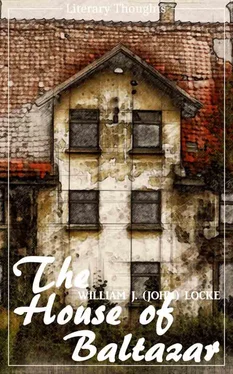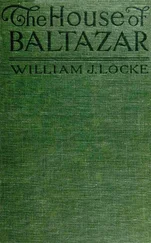“Who has told you the little you do know about him?” she asked.
“My uncle. My mother’s brother. I don’t think I have any relations living on my father’s side. At any rate, I’ve not heard of them. We’re of old Huguenot stock—Revocation of Edict of Nantes refugees—God knows what we were before. Long ago I happened upon a copy somewhere of the Annuaire Militaire de l’Armée Française—and I found a Baltazar in the list. I had an idea of writing him; but I didn’t, of course. Now I suppose the poor devil’s killed. Anyhow, that’s nothing to do with your question. My uncle—Sir Richard Woodcott—they knighted him for manufacturing easily broken hardware round about Birmingham, or for going to chapel, or something—you know the type——”
Again she rebuked him: “I thought you said your uncle brought you up.”
“On my mother’s fortune—he was my guardian and trustee. But he never let me forget that I was the son of John Baltazar. There was no question of affection from either of them—himself or his wife. Anything I did wrong—it was my scoundrel of a father coming out in me. After passing through a childish phase of looking on him as a kind of devil who had blasted my young life, I began to have a sneaking regard for him. You see, don’t you? If he was the antithesis of Uncle Richard, he must be somebody I could sympathize with, perhaps rather somebody who could sympathize with me. They drew me into the arms of his memory, so to speak. Odd, isn’t it?”
“What specifically did they accuse him of?”
“Oh, everything,” he replied, with a careless laugh. “Every depravity under the sun. Colossal egotism and heartlessness the mildest. And of course he drank——”
A sudden red spot flamed in the Sister’s cheek and her tired eyes flashed. “That’s a lie! And so is the other. How dare they?”
“Oh, a pacifist Knight who is making his fortune out of the war will dare anything. Then, of course, there’s what they say about any man who runs away from his wife——”
“To be explicit——?” She leaned an elbow on the table, a cheek on hand, and looked at him steadily.
“Well——” he paused, somewhat embarrassed. “Immorality—you know—other women.”
“That’s not true either. At least, not in that sense. There was another woman. Yes. But only one. And God knows that there could be nothing purer and cleaner and sweeter on this earth than that which was between them.”
“I’m more than ready to believe it,” said John Baltazar’s son. “But—how do you know?”
“It’s the story of a dear friend of mine,” she replied. “Nothing was hidden from me. The girl couldn’t help worshipping him. He was a man to be worshipped. I don’t want to speak evil of your mother—there may have been misunderstandings on both sides—but I knew—my friend and I knew—through acquaintances in Cambridge—never from himself—that his married life was very unhappy.”
“Look here, Sister,” said young Baltazar, putting up an arresting hand. “As we seem to be talking pretty intimately about my affairs, I’ll tell you something I’ve never breathed to a human being. I’ve no childish memories of being tucked up in bed and kissed to sleep by an angel in woman’s form, like children in picture books. Now I come to think of it, I used to envy them. The only vivid thing I remember is being nearly beaten to death with a belt—it was one of those patent leather things women used to wear round their waists—and then being stuffed away in the coal hole.”
“Oh, you poor mite!” Marcelle straightened herself in her chair, and the tears sprang. “Before you were five! Oh, how damnable! What a childhood you must have had! How did you manage to come through?”
He laughed. “I suppose I’m tough. As soon as I went to school—they sent me at eight years old—I was all right. But never mind about me. Go on with your friend’s story. It’s getting interesting. I quite see now that my father may have had a hell of a time.”
“If you quite see,” she said, “there’s little more to tell.”
She leaned forward again on her elbow and, staring across the great hall, through the wide-open doorway to the lawns and trees drenched in the afternoon sunshine, forgot him and lost herself in the sunshine, the most wonderful that ever was, of the years ago. Godfrey Baltazar looked at her keenly yet kindly, and his stern young lips softened into a smile; and after a bit he stretched out a hand and touched her wrist very gently.
“Tell me,” he said in a low voice. “It’s good for me, and may be good for you.”
She came back to the present with a little sigh.
“It’s such a very old story, you see. He was unhappy. His wife’s ungovernable temper drove him from the house. He had to lead his intellectual as well as his physical life. He lived most of his time in college. Went home for week-ends—vainly seeking reconciliation. Then the girl threw herself into his life. She worshipped him. She seemed to give him something sweet and beautiful which he had been looking for. And he fell in love with her. And when she knew it, she was taken up into the Seventh Heaven and she didn’t care for God or woman—only for him. It lasted just a month—the end of the summer term. Oh, it was very innocent, as far as that goes—they only met alone in the open air—stolen hours in the afternoon. Only one kiss ever passed between them. And then he said: ‘I am a brute and a fool. This can’t go on.’ She had given herself to him in spirit and was ready to go on and on whithersoever he chose, so long as she was with him; but she was too shy and tongue-bound to say so. And he stamped along the road, and she by his side, all her heart and soul a-flutter, and he cried: ‘My God, I never thought it would have come to this! My child, forgive me. If ever I hurt a hair of your dear head, may God damn me to all eternity!’ And they walked on in silence and she was frightened—till they came to the turn of the road—this way to Newnham, that to Cambridge. And he gripped her two hands and said: ‘If I withered this flower that has blossomed in my path I should be a damnable villain.’ He turned and walked to Cambridge. And the girl, not understanding anything save her love for him, wept bitterly all the way to Newnham. She neither saw him nor heard of him after that. And a week afterwards he disappeared, leaving no trace behind. And whether he’s alive or dead she doesn’t know till this day. And that is the real story of your father.”
He had turned and put both elbows on the intervening table and, head in hand, listened to her words. When she ended, he said:
“Thank God. And thank you. So that is the word of the enigma.”
“Yes. There is no other.”
“And if he had been less—what shall we say—Quixotic—less scrupulous on the point of a woman’s honour—you would have followed him to the end of the world——”
“I?” She started back from the table. “I? What do you mean?”
“Why the friend, Sister? Why the camouflage?” He reached out his hand and grasped hers. “Confess.”
She returned his pressure, shrugged her shoulders, and said, without looking at him:
“I suppose it was rather thin. Yes. Of course I would have thrown everything to the winds for him. It was on my account that he went away—but, as God hears me, I never sent him.”
A long silence stole on them. There was so much that struggled to be said, so little that could be said. At last the young man gripped his crutches and wriggled from his chair. She rose swiftly to aid him.
“Let us have a turn in the sun. It will be good for us.”
So they went out and she helped him, against his will—for he loved his triumph over difficulties—down the majestic marble stairs, and they passed the happy tennis courts and the chairs of the cheery invalids looking on at the game, and on through the Japanese garden with its pond of great water-lilies and fairy bridge across, and out of the gate into the little beech wood that screened the house from the home farm. On a rough seat amid the sun-flecked greenery they sat down.
Читать дальше












